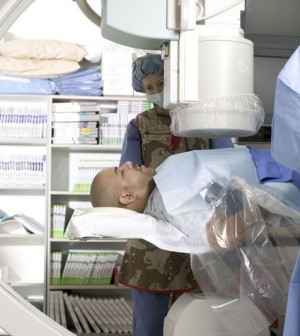- Could Your Grocery Store Meat Be Causing Recurring UTIs?
- Are You Making This Expensive Thermostat Error This Winter?
- Recognizing the Signs of Hypothyroidism
- 10 Strategies to Overcome Insomnia
- Could Artificial Sweeteners Be Aging the Brain Faster?
- Techniques for Soothing Your Nervous System
- Does the Water in Your House Smell Funny? Here’s Why
- Can a Daily Dose of Apple Cider Vinegar Actually Aid Weight Loss?
- 6 Health Beverages That Can Actually Spike Your Blood Sugar
- Treatment Options for Social Anxiety Disorder
When Is the Cost of Cancer ‘Toxic’?


A tool to assess “financial toxicity” for cancer patients — namely, the expense, anxiety and stress of illness-related costs — has been developed by University of Chicago Medical Center cancer specialists.
Many cancer patients face exorbitant and unpredictable treatment costs often at a time when they’re less able to work, the researchers point out.
“Few physicians discuss this increasingly significant side effect with their patients,” study author Dr. Jonas de Souza, a head-and-neck cancer specialist, said in a university news release. “Physicians aren’t trained to do this. It makes them, as well as patients, feel uncomfortable. We aren’t good at it.”
According to de Souza, “a thoughtful, concise tool that could help predict a patient’s risk for financial toxicity might open the lines of communication.”
The team developed a brief questionnaire after discussions with 150 patients with advanced cancer, according to the study in the July issue of the journal Cancer.
For each of the 11 questions — such as “My out-of-pocket medical expenses are more than I thought they would be” or “I am not able to meet my monthly expenses” — patients choose from five potential responses: not at all, a little bit, somewhat, quite a bit, or very much.
The patients’ answers help health care providers identify those who may require assistance such as financial counseling or referral to a support network.
“We need better ways to find out which patients are most at risk,” de Souza said. “Then we can help them get financial assistance. If patients know what to expect, they may want their physicians to consider less costly medications.”
The cost of cancer care in the United States is rising faster than the cost of overall health care, the researchers said. Also, the cost of new cancer drugs is increasing more rapidly than the cost of overall cancer care, they added.
Annual medical costs increase by more than $4,000 for male cancer survivors and by nearly $3,300 for female cancer survivors, according to a recent study from the U.S. Centers for Disease Control and Prevention.
Meanwhile, about 30 percent of cancer survivors can’t return to work or are less able to work, according to the CDC.
More information
The American Society of Clinical Oncology has more about cancer costs.
Source: HealthDay
Copyright © 2026 HealthDay. All rights reserved.










